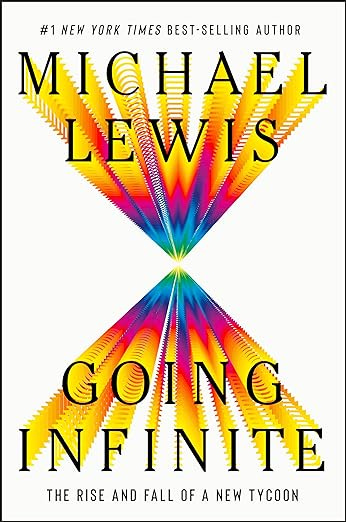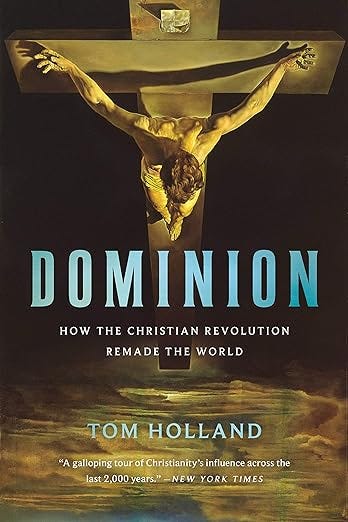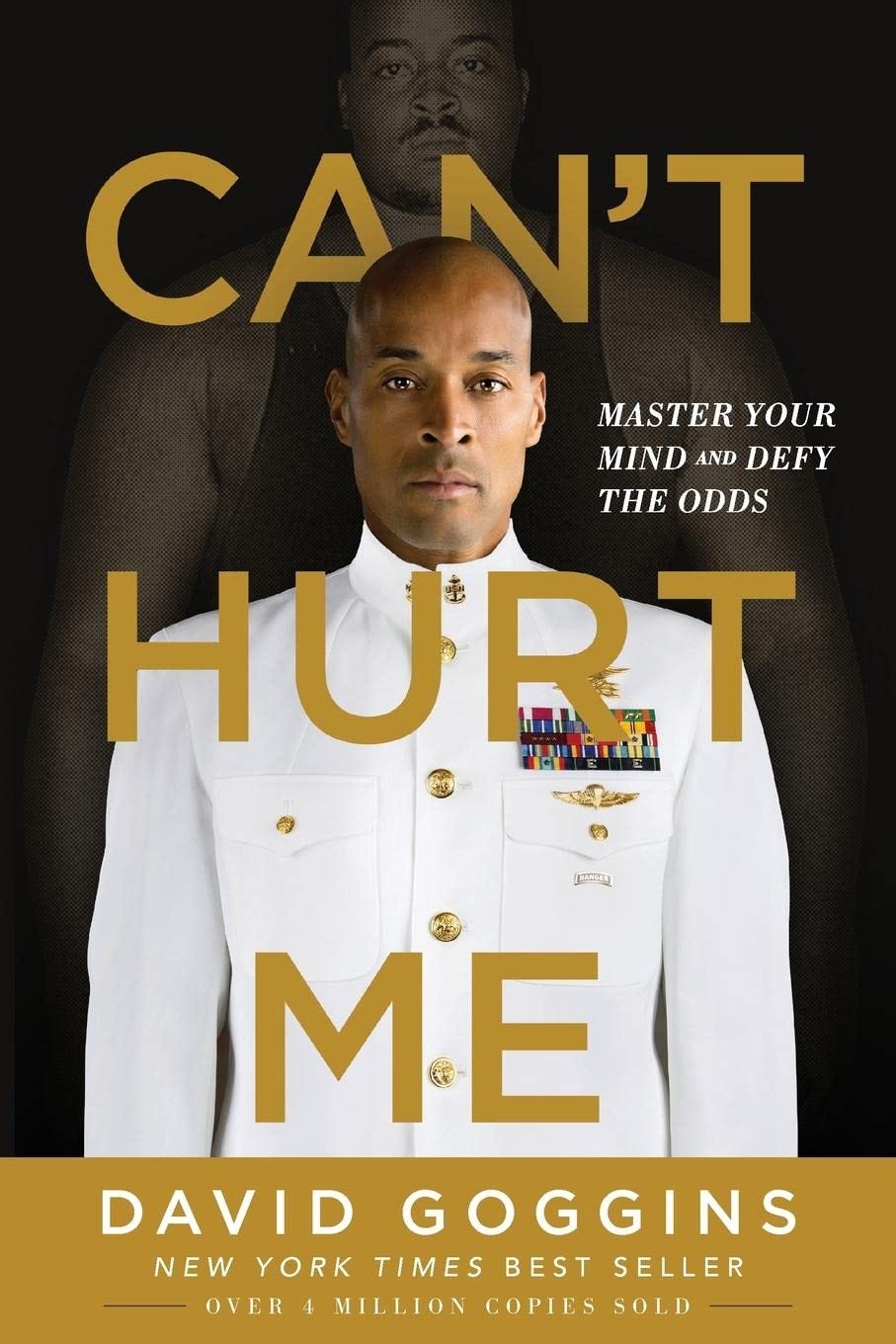This month we read:
Going Infinite: The Rise and Fall of a New Tycoon by Michael Lewis
The Luxury Strategy by Jean-Noël Kapferer and Vincent Bastien
How Do You Know by Chris Mayer
Dominion: How the Christian Revolution Remade the World by Tom Holland
Can’t Hurt Me by David Goggins
Do you have a “stranded” 401(k) from a past job that is neglected and unmanaged? Eagle Point offer separately managed accounts to retail investors, and 401(k) rollovers are often a good fit for our long-term approach. If you would like to invest with Eagle Point Capital or connect with us, please email info@eaglepointcap.com.
Going Infinite: The Rise and Fall of a New Tycoon by Michael Lewis
Going Infinite, Michael Lewis’s latest book, is the story of Sam Bankman-Fried. It’s a tragedy of ego and hubris. IBM’s Tom Watson said “I’m no genius, but I’m smart in spots and I stay around those spots.” Watson understood his circle of competence. SBF did not.
SBF was good at math and puzzles, which allowed him to thrive at MIT and Jane Street. These offered enough structure to contain SBF’s ego and channel his mind into the spots where it thrived.
Crypto had no rules and SBF went off the rails. He had no constraints and no adult supervision. He bet aggressively, and at first this worked. He was worth tens of billions of dollars by his 30th birthday. The money reinforced his ego and proved to himself and others that he was smarter than everyone else.
Lewis seems to believe that SBF never set out to defraud investors. FTX and Alameda were just one big pile of money to SBF, and he didn’t worry about which assets were where. But that’s not how the real world works.
At best, FTX’s collapse was a mistake of leverage and illiquidity. Alameda borrowed heavily from FTX, an unwitting loan from FTX’s customers that could be called at any moment. Alameda invested these short-dated liabilities into illiquid, long-dated investments like startups, obscure crypto tokens, and beachside Bahamas real estate. When confidence in FTX wavered, everyone rushed for the door at the same time.
The problem with this view is the cognitive dissonance that it causes. How could SBF be a genius mathematician and trader but unable to understand the risk of borrowing short to invest long?
The answer may be that SBF doesn’t believe in reading books. He told Adam Fisher:
I’m very skeptical of books. I don’t want to say no book is ever worth reading, but I actually do believe something pretty close to that. I think, if you wrote a book, you f**ked up, and it should have been a six-paragraph blog post.
If you think every idea can be reduced to six paragraphs, you don’t understand nuance or context. You think the world is black and white when its really shades of grey.
Contrast that with a statement by Charlie Munger:
In my whole life, I have known no wise people (over a broad subject matter area) who didn't read all the time -- none, zero. You'd be amazed at how much Warren reads--and at how much I read. My children laugh at me. They think I'm a book with a couple of legs sticking out.
SBF may have been smart, but he wasn’t wise, and he didn’t know the difference. As Mark Twain observed ”It ain't what you don't know that gets you in trouble. It's what you know for sure that just ain't so."
Lewis debates whether FTX was illiquid or insolvent when it filed bankruptcy. SBF claims it was illiquid and FTX collapsed because of a bank run. Prosecutors will argue FTX was insolvent.
Crypto prices, especially the obscure ones Alameda owned, were reflexive. They don’t have cash flows so their value derives from the public’s confidence in them and the institutions behind them. When FTX collapsed, confidence in the tokens FTX backed collapsed, making Alameda’s pile of tokens worthless and FTX insolvent. It was reflexivity at its finest. A true house of cards.
Matt
The Luxury Strategy by by Jean-Noël Kapferer and Vincent Bastien
Luxury businesses are fascinating to me because they largely do not obey traditional laws of economics. The Luxury Strategy is an interesting read about the business model of premier luxury companies such as LVMH, Hermes, Ferrari, and more.
The authors define luxury as products (or to a lesser extent, services) that are: timeless, non-comparable, rare/scarce, and defined by social stratification or elevation. In short, they are products “offered at a price that far exceeds what their mere functional value would command”. Most have achieved luxury status after decades, or even hundreds of years, of brand building.
One of the tell-tale signs of a good business is when a company has a high degree of pricing power. True luxury goods companies are the poster children for pricing power. But why? In many luxury businesses it comes down to a rigorous control over supply.
In traditional consumer goods businesses, brands strive to maximize supply to meet a (hopefully) growing demand. The marketing teams focus on volume and throughput, meaning they aim to sell as much as they can make. This entails finding the sweet spot on price and competing vigorously. Luxury businesses are the opposite.
Companies like Ferrari, Hermes, and Louis Vuitton operate with self-imposed supply limits, making it hard for customers to secure these iconic goods. Ferrari forces you to wait 18 months for your $350K car, making the anticipation part of the experience. When you combine ultra-wealthy individuals competing for a scarce supply of luxury goods it results in amazing pricing power.
Perhaps my favorite example of supply/demand discipline in the book comes from Louis Vuitton. At the end of each year to avoid mark-downs or discounts (a cardinal sin in luxury), Louis Vuitton destroys any unsold inventory. This is just one fascinating difference in how these companies behave compared to a traditional retailer.
Taken further, many luxury companies sell “Veblen Goods”, which are products where demand increases when prices increase. These businesses really flip traditional price/elasticity on their heads, and are worth trying to understand.
Dan
How Do You Know by Chris Mayer
Chris Mayer is one of my favorite investors/bloggers to follow, and he also wrote the book 100 Baggers, another excellent read. How Do You Know is his most recent book about how to think more clearly in both financial markets and life.
Chris points out many of the comical and illogical short-term aspects of financial markets, such as how changing a company’s name can result in dramatically improved stock price performance, or how Exxon Mobile can be included in seemingly every kind of ETF depending on who puts it together. He discusses the problem with vague financial terms like “the economy”, “GDP”, and “value stocks”. One of my favorite ideas from the book is Mayer’s take on philosopher Alfred Korzybski’s famous quote: “the map is not the territory”.
Investors often take labels at face value and accept the narratives around a stock (the map) rather than investigating what is truly going on in the business (the territory). This can lead to all sorts of mistakes. Mayer did a nice job summarizing this idea on a recent podcast:
Just because we attach a word to something doesn't mean it accurately describes what it actually is, as emphasized by the quote "The map is not the territory" by Korzybski.
The categorization of stocks as value or growth is arbitrary and meaningless, as investors who identify as value or growth investors often own the same stocks and the labels do not accurately reflect the nature of individual stocks and businesses.
General semantics challenges the use of abstract terms and encourages individuals to question the meaning and significance behind commonly used terms like GDP and the state of the economy.
Value and growth investing are not mutually exclusive, and the labels of value stocks and growth stocks can be misleading; instead, investors should focus on seeing through these labels and continuously study and question the ever-changing nature of companies and their competitive advantages.
The map/territory idea can be summed up for investors succinctly: always remember to think for yourself.
Dan
Dominion: How the Christian Revolution Remade the World by Tom Holland
David Perell’s essay “Why You’re Christian” piqued my interest in this book. Perell argues that Christianity so thoroughly shaped western society that we are like fish describing water when we talk about Christianity’s influence on our beliefs. That applies whether we consider ourselves religious or not.
For example, the Declaration Of Independence links human rights to Christian values when it says, “We hold these truths to be self-evident, that all men are created equal, that they are endowed by their Creator with certain unalienable Rights, that among these are Life, Liberty and the pursuit of Happiness.”
Christian values are so pervasive in the west that it’s hard to imagine a society based on anything else. Holland, a scholar of the Roman Empire, takes readers back to pagan Rome. In Caesar’s day Roman society celebrated the strong and the powerful and stripped the weak and poor of any dignity.
Caesar rose to power and fame in Rome by killing and enslaving over one million Gauls for no reason besides his own glory. Caesar did not have the explicit blessing of the Roman Senate to conquer Gaul, he raised an army and just did it. He became the most celebrated and respected man of his day. No one blinked at the human cost of Caesar’s conquest because it wasn’t considered a cost. The Romans believed that those poor Gauls who died protecting themselves had no dignity or value precisely because they lost the war.
Before Christianity, Gods were powerful, violent, and feared. Think of Zeus, Poseidon, Apollo, or Athena in The Iliad and The Odyssey. Gods lived heroically and never died. When Jesus died on the cross, a form of death reserved for the most wretched thieves and slaves, he empowered and dignified to the poor. After that, being poor and weak was considered a blessing, not a curse.
For example,
Blessed are the poor in spirit, for theirs is the kingdom of heaven.
— Matthew 5:3
Looking at his disciples, he said: 'Blessed are you who are poor, for yours is the kingdom of God.'
— Luke 6:20
The tide shifted slowly at first, gaining steam through Charlemagne’s empire and into the Enlightenment.
The pervasive influence of Christian values on believers and non-believers alike in American society makes me wonder what other subconscious influences are acting on me without me ever realizing it. There’s merit to living an examined life, knowing why you believe the things you believe. This is incredibly important in investing, where questioning the popular narrative is at least half of the job.
Matt
Can’t Hurt Me by David Goggins
When I’m taking a detour from a book not directly related to business or investing I like reading about history or about people who have accomplished seemingly superhuman feats. Can’t Hurt Me falls squarely in the latter category.
David Goggins is a former Navy Seal and current ultramarathon runner. In his book Goggins details how he overcame a horrific childhood and being so overweight he couldn’t run 100 yards to accomplishing physical feats from running 130 straight miles in the summer in death valley to setting the world record for pull-ups by doing over 4,000 in seventeen hours. Goggins believes most people only tap into 40% of their potential, and he aims to help people find a way to tap into their extra 60%, like he has.
Goggins’ discipline is something all investors can learn from. Just as he did not go from 300 pounds and only running a quarter mile in 1999 to running 209 straight miles in 2007 overnight, investors cannot get rich overnight. It takes patience, discipline, and making a little bit of progress, consistently, to end up where you want to go. Or, as Buffett puts it; “You can't produce a baby in one month by getting nine women pregnant.”
Goggins also talks about the concept of “no finish line”. He pushes himself physically and mentally not to reach a specific destination, but rather as a way of life. Likewise in investing, at least for us, there is no finish line. It’s about consistently avoiding dumb decisions, learning every day, and getting ahead over long periods of time.
Dan
The Best of the Rest
Chris Mayer: Drawdowns. “What I found affirmed what Peter Lynch once said: “The real key to making money in stocks is not to get scared out of them.”
Indeed. Knowing this, I can be more circumspect about drops in my own stocks. As long as the underlying business continues to perform within a band of expectations, I am better off staying put.”
Howard Marks: Further Thoughts on Sea Change. “Unless there are serious holes in my logic, I believe significant reallocation of capital toward credit is warranted.”
The Art of Investing: Todd Combs - Investing, the Last Liberal Art.
Class V Group: Bill Ackman Has It Right. Comparing SPACs to SPARC.
Lawrence Hamtil: The Optimal Industry Structure. Oligopolies are best for stable cash extraction. Fragmented and consolidating industries produce the biggest winners.
Do you have a “stranded” 401(k) from a past job that is neglected and unmanaged? Eagle Point offer separately managed accounts to retail investors, and 401(k) rollovers are often a good fit for our long-term approach. If you would like to invest with Eagle Point Capital or connect with us, please email info@eaglepointcap.com.
Disclosure: The author, Eagle Point Capital, or their affiliates may own the securities discussed. This blog is for informational purposes only. Nothing should be construed as investment advice. Please read our Terms and Conditions for further details.









